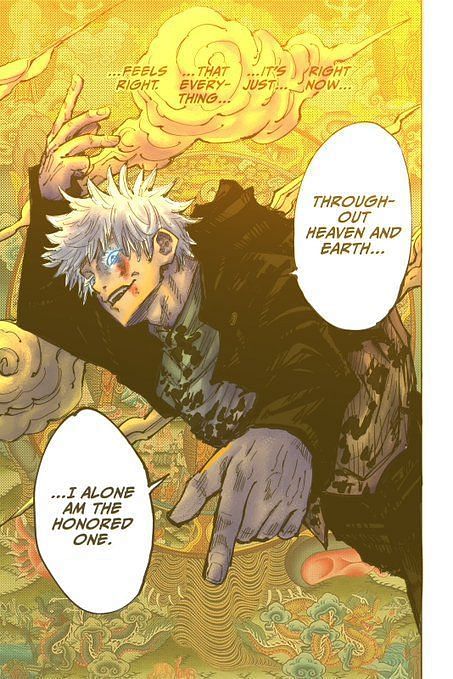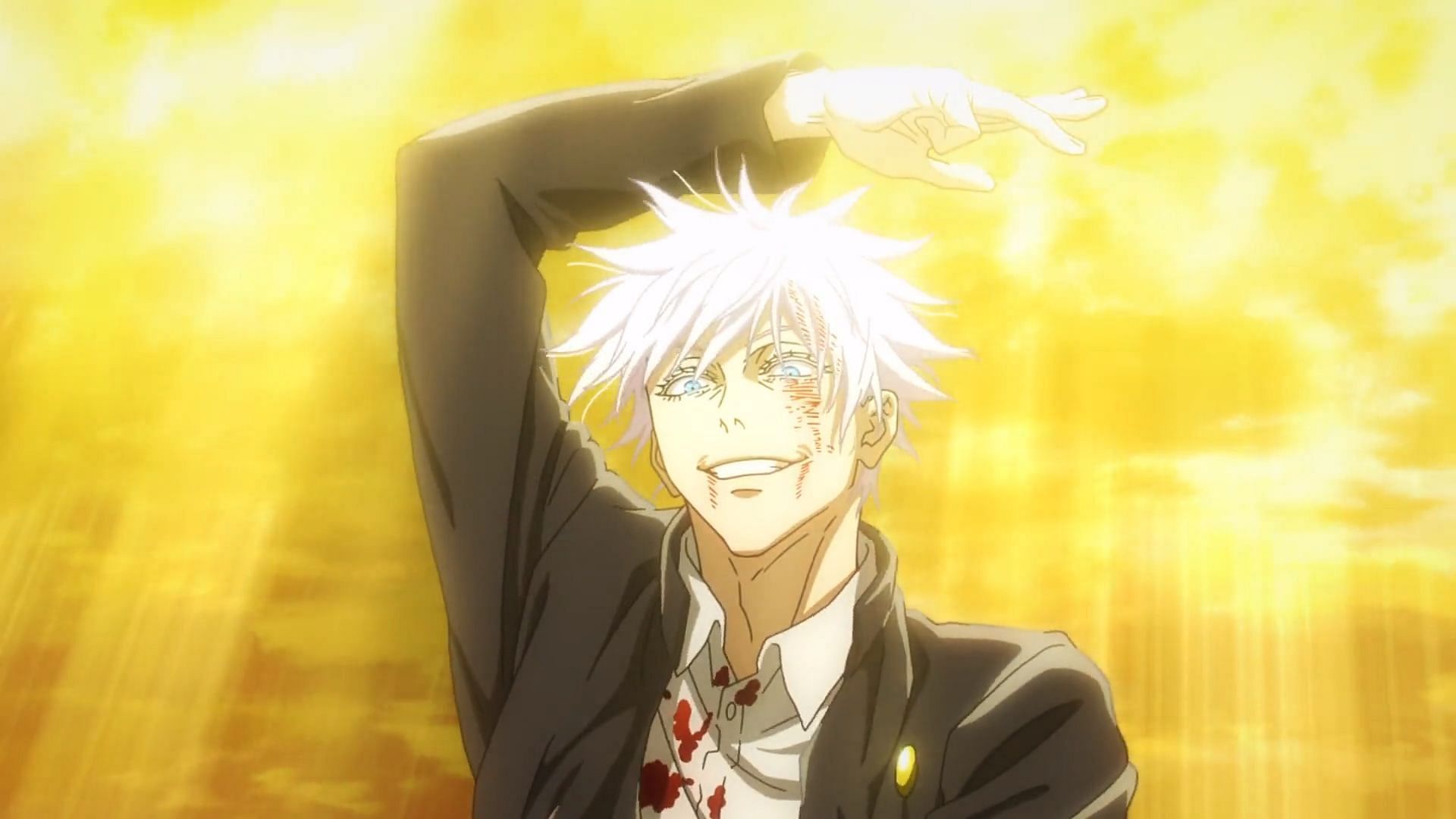Have you ever heard a phrase that just sticks with you, one that seems to carry so much weight and history? Perhaps you've encountered "throughout heaven and earth, I alone am the honored one" in a profound piece of literature, a deep spiritual discussion, or even a popular animated series. It's a line that, quite honestly, has a way of stopping you in your tracks, making you ponder its true depth. This powerful declaration, you know, has quite a story, stretching back through ages and across cultures.
This particular saying, you see, holds a really special place in many hearts, appearing in contexts that are sometimes worlds apart. It's not just a string of words; it's a concept that has been interpreted in so many different ways, often sparking lively discussions about its meaning. From ancient philosophical texts to the thrilling moments of a modern story, its presence is, well, pretty undeniable.
So, what exactly makes this phrase so compelling? Is it a statement of immense personal pride, or does it hint at something far more profound, a kind of universal truth? Today, we're going to take a closer look at "throughout heaven and earth," exploring its deep roots in ancient wisdom and seeing how it has found new life in our contemporary world. We'll peel back the layers, you know, to really get at what makes this declaration so enduring.
Table of Contents
- The Ancient Roots of "Throughout Heaven and Earth"
- The Buddha's Birth and Proclamation
- A Humble Declaration, Not Arrogance
- Its Presence in Buddhist Texts
- "Throughout Heaven and Earth" in Pop Culture
- Gojo Satoru's Iconic Utterance
- A Statement of Power or Personal Revelation?
- The Nuance of Interpretation
- Why This Phrase Resonates Today
- Finding Your Own Unique Path
- Beyond Ego: A Call to Self-Realization
- Frequently Asked Questions About "Throughout Heaven and Earth"
The Ancient Roots of "Throughout Heaven and Earth"
The phrase "throughout heaven and earth, I alone am the honored one" isn't just some random saying; it has a truly remarkable origin story that goes back thousands of years. Its earliest known appearance is tied to the very moment of the Buddha's birth, a truly significant event in Buddhist traditions. According to an ancient legend, immediately after his birth, the Buddha took seven steps in each of the four cardinal directions. And, interestingly enough, lotus flowers are said to have bloomed with each step he took, which is just a rather beautiful image, wouldn't you say?
The Buddha's Birth and Proclamation
It's at this very moment, standing there, that the Buddha is said to have pointed one hand towards the heavens and the other towards the earth, uttering this profound declaration. This act, you know, wasn't just a casual gesture; it was a deeply symbolic one. The Dirgha Agama, an important Buddhist text, mentions this specific event, describing how the Buddha, right after his birth, made this powerful statement. It's a scene that has been recounted and revered for centuries, pretty much forming a cornerstone of Buddhist lore.
This proclamation, in its original context, marked the arrival of a truly unique being, someone who would achieve supreme enlightenment and show the way for all others. It was, in a way, a cosmic announcement, signifying that a path to liberation was now available to everyone. The very idea that he would point to both heaven and earth really emphasizes the scope of his message, reaching across all possible existence, you know, from the highest realms to the lowest.
A Humble Declaration, Not Arrogance
Now, when you first hear "I alone am the honored one," it might sound a bit boastful, perhaps even arrogant to some. But, actually, in the context of Buddhist cosmology, it's quite the opposite. The phrase is about achieving enlightenment, a state of being where one truly understands the nature of reality. After attaining this supreme enlightenment, the Buddha used his holy sight to look throughout all realms, across all domains of samsara – which are, you know, the cycles of birth, death, and rebirth – searching for anyone nobler than himself to pay homage to. And, rather humbly, he found none.
So, this wasn't a claim of superiority in a worldly sense, but a recognition of his unique position as the one who had awakened to the ultimate truth, a truth that could benefit all beings. It was, in essence, a declaration of his unparalleled capacity to guide others towards freedom from suffering. That seems very humble to me because those are just domains of samsara in Buddhist cosmology, so technically true, but not really being arrogant, which is pretty cool when you think about it.
This understanding frames the statement not as a display of ego, but as a profound expression of his mission. It's a statement that says, "I am here to show you the way, a way that no one else has fully realized or can teach in this moment." It's a call to attention, really, inviting all beings to recognize the unique opportunity presented by his manifestation in the world. This is, you know, a complete mission statement in that sense.
Its Presence in Buddhist Texts
Beyond the Dirgha Agama, this powerful phrase resonates throughout various other significant Buddhist texts and traditions. The Lotus Sutra, for instance, which is one of the most influential and venerated Mahāyāna Buddhist sūtras, also features this quote. Its inclusion in such a prominent text really highlights its importance and widespread recognition within Buddhist thought. This isn't just a fleeting mention; it's a core idea.
In Chinese and especially Japanese Buddhism, the statement 天上天下唯我独尊 (Japanese: tenjou tenge yui ga dokuson) is commonly translated as "on heaven and earth, I alone am honored." This phrase is, you know, deeply embedded in their spiritual lexicon. It's also found throughout the Zen record of ancient China. For example, Master Yunmen related the legend according to which the Buddha, immediately after his birth, uttered this very quote. So, it's clear this saying has been a vital part of Buddhist teachings and narratives for a very long time, carrying immense spiritual weight across different schools and regions.
"Throughout Heaven and Earth" in Pop Culture
While its ancient origins are deeply rooted in spiritual philosophy, the phrase "throughout heaven and earth, I alone am the honored one" has, quite surprisingly, experienced a massive resurgence in modern pop culture. Thanks to its iconic use in a highly popular anime series, it has found a whole new audience, sparking curiosity and discussion among a generation who might not be familiar with its Buddhist beginnings. This is, you know, a rather interesting turn of events for an ancient saying.
Gojo Satoru's Iconic Utterance
Arguably the most famous recent appearance of this quote comes from the character Gojo Satoru in the anime and manga series Jujutsu Kaisen. In a strikingly beautiful scene in season 2, episode 4, Gojo utters this line, which gives even his greatest fans pause. It's probably the most iconic line in the series, and it just got adapted in the fourth episode of the second season of the anime, which was a huge moment for fans, you know.
Gojo says, "throughout heaven and earth, I alone am the honored one," right after a pivotal moment where he has truly grasped his immense power. This proclamation isn't just a throwaway line; it's a declaration of his newfound understanding of his own capabilities and his unique place in the world. On the banners above Gojo's head, it is actually written 天上天下 唯我独尊, which translates directly to "throughout heaven and earth I alone am honored." This visual cue really drives home the significance of his words.
His whole speech to Toji before killing him, where he says, "I'm not even angry over you right now, I bear no grudges against anyone, it's just that the world feels so, so wonderful," adds another layer to this scene. It suggests a state of profound clarity and exhilaration, almost a feeling of cosmic rightness, which aligns in some respects with the Buddha's enlightened state, even if the context is very different.
A Statement of Power or Personal Revelation?
The way Gojo uses this phrase has led to a lot of debate among fans. Is it a pure statement of arrogance, a boast of his overwhelming strength and hubris? Or is it something more nuanced, a moment of profound personal revelation where he truly understands his unparalleled position and the immense responsibility that comes with it? Many opinions mentioned above regarding the nature of Gojo and how he could have said it arrogantly are quite common.
The wordplay in "throughout heaven & earth, I alone am the honored one" is often meant to be egotistical, describing the hubris of one who claims to be the best. This interpretation certainly fits the powerful, sometimes cocky, persona Gojo often projects. However, personally, I too share your opinion that there's more to it. It could also be seen as a mission statement, a recognition of his unique role in the world of Jujutsu Sorcerers, much like the Buddha's original declaration was a mission statement for all beings.
The phrase, in Gojo's mouth, arguably describes his unique ability to see the world differently, to perceive the flow of cursed energy in a way no one else can. It's a moment where he truly becomes "the strongest," not just in terms of raw power, but in his complete mastery and understanding of his own existence within that world. It's almost as if he's saying, "I am the pinnacle of what a sorcerer can be, and in this specific domain, my understanding is unmatched," which is a rather powerful thought.
The Nuance of Interpretation
The fascinating thing about this phrase, whether in ancient texts or modern media, is its incredible flexibility in interpretation. For the Buddha, it was about achieving enlightenment and recognizing his role as a guide for all beings, from the higher realms (heaven) to the lower realms (earth), who would be able to recognize in his manifestation that there was a path to liberation. Such a noble action undoubtedly represented his unrivaled modesty, believe it or not.
For Gojo, while it might appear as hubris, it can also be seen as a declaration of self-realization within his specific universe. He's recognizing his unique place and immense power, which, in his world, makes him a singular force. The phrase itself is so potent that it can carry both the weight of profound spiritual humility and the swagger of overwhelming strength, depending on who is saying it and in what context. It's pretty cool how a single set of words can hold so much varied meaning, you know.
Why This Phrase Resonates Today
The enduring appeal of "throughout heaven and earth, I alone am the honored one" goes beyond its historical or pop culture appearances. It taps into something very fundamental about the human experience: the search for meaning, purpose, and a unique place in the vastness of existence. This phrase, you know, really encourages us to think about our own significance.
Finding Your Own Unique Path
At its core, the phrase, especially when stripped of its more boastful interpretations, speaks to the idea of finding your own unique path and recognizing your individual worth. It's not about being better than everyone else in a competitive way, but about acknowledging your distinct journey and the specific contributions you can make. Just like the Buddha's enlightenment was his own unique achievement, and Gojo's power is his own, we too have aspects of ourselves that are singularly ours.
This concept can be incredibly empowering. It suggests that each person has a special role to play, a particular wisdom to gain, or a specific strength to develop that is entirely their own. It encourages self-discovery and the pursuit of personal excellence, not for the sake of comparison, but for the sake of realizing one's full potential. It's about owning your capabilities, you know, and understanding your place in the grand scheme of things.
Beyond Ego: A Call to Self-Realization
When we look past any initial perception of arrogance, the phrase becomes a powerful call to self-realization. It challenges us to consider what it means to be truly "honored" not by external validation, but by an internal understanding of our own nature and purpose. In the Buddhist sense, it's about awakening to the truth of existence and transcending the limitations of ego, which is a rather deep thought.
For individuals today, this can translate into a journey of personal growth, striving to live authentically and in alignment with one's deepest values. It's about recognizing the inherent dignity and potential within oneself, understanding that your unique experience and perspective are valuable. It's a reminder that, in your own way, and in your own life, you too are a significant being, capable of profound understanding and positive impact. Learn more about spiritual awakening on our site, and link to this page for personal growth insights.
The phrase, then, transforms from a seemingly bold statement into a profound philosophical inquiry: What does it mean for me to be "honored" in my own life, throughout my own "heaven and earth"? It invites reflection on personal responsibility, the pursuit of wisdom, and the impact we have on the world around us. This idea, you know, truly resonates with many who are looking for deeper meaning.
Frequently Asked Questions About "Throughout Heaven and Earth"
What is the original meaning of "Throughout Heaven and Earth, I alone am the honored one"?
The original meaning of "Throughout Heaven and Earth, I alone am the honored one" comes from ancient Buddhist tradition, specifically attributed to the Buddha himself at the moment of his birth. It's not a statement of arrogance, but rather a profound declaration of his unique position as the one who would achieve supreme enlightenment and show the path to liberation for all beings. After attaining this deep understanding, the Buddha, it is said, looked across all realms of existence, from the highest heavens to the lowest earths, and found no one else who had achieved such a complete awakening or could guide others in the same way. So, it was a humble recognition of his singular role in that specific moment, a rather important announcement for the world.
Why did Gojo say "Throughout Heaven and Earth, I alone am the honored one"?
Gojo Satoru, a character in Jujutsu Kaisen, utters "Throughout Heaven and Earth, I alone am the honored one" during a pivotal moment when he fully grasps and masters his immense power. This declaration marks his transition into becoming "the strongest" sorcerer, understanding his unique capabilities and unparalleled position within his world. While some interpret it as a display of arrogance or hubris, it can also be seen as a profound moment of self-realization and acceptance of his unique role and responsibility. His feeling that "the world feels so, so wonderful" right after, suggests a state of absolute clarity and exhilaration at his own strength and understanding, which is a pretty powerful feeling.
Is the phrase "Throughout Heaven and Earth, I alone am the honored one" arrogant?
Whether the phrase "Throughout Heaven and Earth, I alone am the honored one" is arrogant depends entirely on its context and the speaker's intent. In its original Buddhist context, spoken by the Buddha, it is understood as a statement of profound humility and a recognition of his unique enlightened state, not worldly pride. He was acknowledging his singular ability to guide all beings to liberation. However, when used in other contexts, like by a powerful fictional character such as Gojo Satoru, it can certainly be interpreted as a display of immense power, confidence, or even hubris. The wordplay in its modern usage is often meant to convey an egotistical claim, describing the sheer confidence of one who feels they are unmatched. So, it really depends on the situation and who is saying it, you know.
The phrase "throughout heaven and earth, I alone am the honored one" truly stands as a testament to the enduring power of words, stretching from ancient spiritual wisdom to the vibrant narratives of today's pop culture. It asks us to consider profound questions about individual significance, the nature of power, and the path to self-realization. Whether you encounter it in a sacred text or a thrilling anime, its ability to provoke thought and inspire reflection is, you know, quite remarkable. It reminds us that some ideas simply transcend time and context, continuing to resonate deeply with the human spirit.
This timeless declaration, in its many forms, invites us to look inward and consider our own unique place in the world, to find what makes us "honored" in our own lives. It's a prompt to explore our potential, to understand our impact, and to recognize the inherent value of our individual journeys. The conversation around this phrase, you see, is far from over; it simply keeps evolving, much like our own understanding of ourselves and the vast universe around us. For further reading on the historical context of Buddhist texts, you might find this resource helpful: Britannica's entry on the Lotus Sutra.



